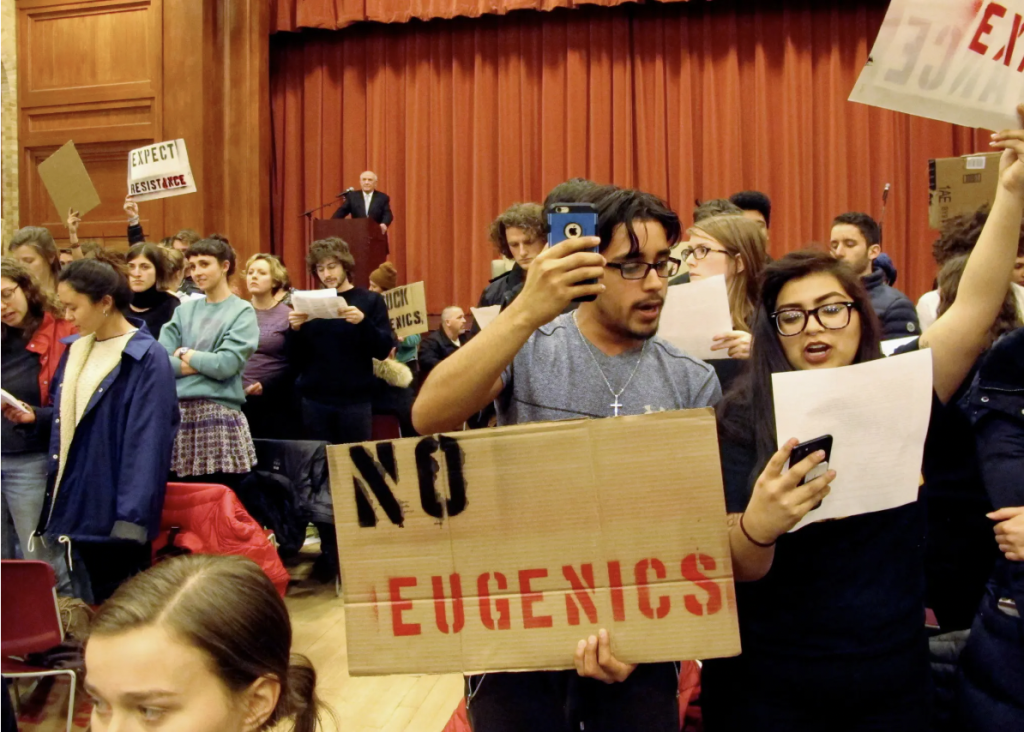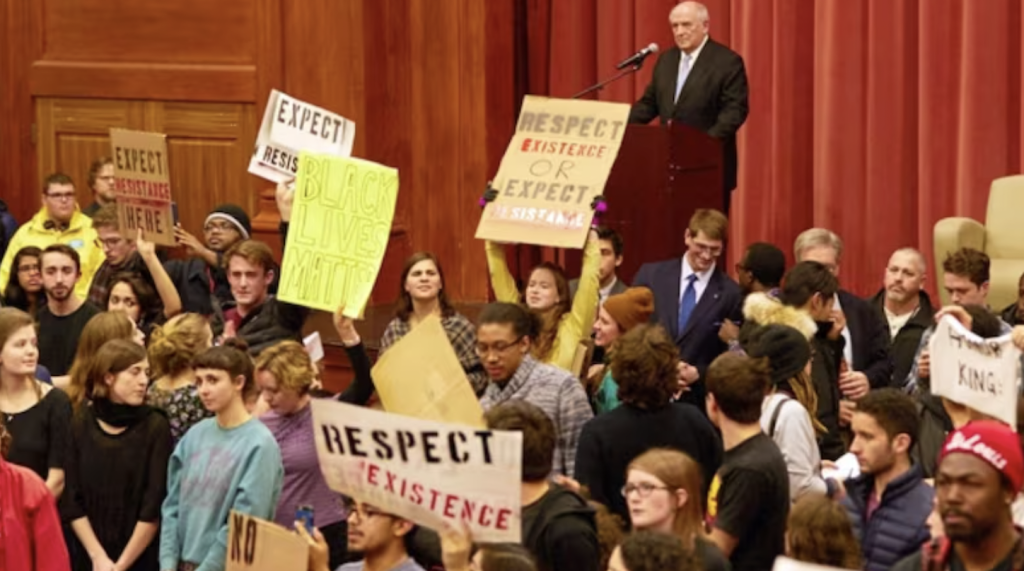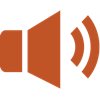Mayhem at Middlebury College
Updated: Feb. 6, 2025
“Congress shall make no law respecting an establishment of religion, or prohibiting the free exercise thereof; or abridging the freedom of speech, or of the press; or of the right of the people peaceably to assemble, and to petition the Government for a redress of grievances.”

Introduction
In March 2017, hundreds of students at Middlebury College in Vermont disrupted an event with Charles Murray, a political scientist and controversial speaker whom some considered a white supremacist. The protest escalated into a violent confrontation that left faculty member Allison Stanger injured.
This incident became one of the highest-profile examples of student protesters shouting down a speaker with whom they disagreed, setting a precedent for similar events. Immediately, the chaotic scene drew criticism from conservatives, who condemned the students as intolerant, accusing them of engaging in mob mentality and stifling free speech.
In 1994, Murray co-authored “The Bell Curve,” a book that links lower socioeconomic status to race and intelligence. The book sparked intense debate and has been widely criticized for overemphasizing genetic explanations for intelligence and socioeconomic status while downplaying environmental, social, and historical factors. Even today, the book remains a contentious topic in discussions about race, intelligence, and policy.
The Incident and Its Aftermath
 Professor injured, students sanctioned at Middlebury College in Vermont after conservative speaker is protested, Free Speech Project, March 2017
Professor injured, students sanctioned at Middlebury College in Vermont after conservative speaker is protested, Free Speech Project, March 2017 Hundreds of Middlebury students protest speaker, NBC5, March 2017
Hundreds of Middlebury students protest speaker, NBC5, March 2017 Protesters Disrupt Speech by ‘Bell Curve’ Author at Vermont College, The New York Times, March 2017
Protesters Disrupt Speech by ‘Bell Curve’ Author at Vermont College, The New York Times, March 2017 Allison Stanger’s Facebook post, Facebook, March 2017
Allison Stanger’s Facebook post, Facebook, March 2017 Understanding the Angry Mob at Middlebury That Gave Me a Concussion, The New York Times, March 2017
Understanding the Angry Mob at Middlebury That Gave Me a Concussion, The New York Times, March 2017 More Sanctions (and Debate) at Middlebury, Inside Higher Education, May 2017
More Sanctions (and Debate) at Middlebury, Inside Higher Education, May 2017 Charles Murray speaks at Columbia, with support of nearly 150 faculty members, USA Today, March 2017
Charles Murray speaks at Columbia, with support of nearly 150 faculty members, USA Today, March 2017 Charles Murray Event Draws Protest, The Harvard Crimson, September 2017
Charles Murray Event Draws Protest, The Harvard Crimson, September 2017 The Real Problem with Charles Murray and ‘The Bell Curve’, Scientific American, April 2017
The Real Problem with Charles Murray and ‘The Bell Curve’, Scientific American, April 2017
Similar Incidents on the Free Speech Tracker
 Students in Pennsylvania protest speaker, engage respectfully during Q&A period — March 2017
Students in Pennsylvania protest speaker, engage respectfully during Q&A period — March 2017 Student protesters in California block conservative speaker from entering building — April 2017
Student protesters in California block conservative speaker from entering building — April 2017 Death threats cancel commencement address at University of California, San Diego — June 2017
Death threats cancel commencement address at University of California, San Diego — June 2017 Jesuit priest disinvited from university in DC due to pro-LGBTQ beliefs — September 2017
Jesuit priest disinvited from university in DC due to pro-LGBTQ beliefs — September 2017 Law students at Lewis & Clark College interrupt appearance by Christina Hoff Summers — March 2018
Law students at Lewis & Clark College interrupt appearance by Christina Hoff Summers — March 2018 Middlebury College cancels scheduled lecture by Polish philosopher/politician and planned protest, amid safety concerns — May 2019
Middlebury College cancels scheduled lecture by Polish philosopher/politician and planned protest, amid safety concerns — May 2019 Protesters shout down then-Acting Homeland Security Secretary at Georgetown Law — October 2019
Protesters shout down then-Acting Homeland Security Secretary at Georgetown Law — October 2019 Georgia college students protest author’s message by burning books — October 2019
Georgia college students protest author’s message by burning books — October 2019 Kennesaw State students object to speaker at Martin Luther King Jr. holiday event — January 2020
Kennesaw State students object to speaker at Martin Luther King Jr. holiday event — January 2020 University of British Columbia sued for canceling talk by U.S. journalist — January 2020
University of British Columbia sued for canceling talk by U.S. journalist — January 2020 Gun rights activist forced off Ohio University campus by protesters — February 2020
Gun rights activist forced off Ohio University campus by protesters — February 2020 Two Students Disrupt College Republicans Tabling Event at UC Santa Cruz, Prompt University Police Response — April 2020
Two Students Disrupt College Republicans Tabling Event at UC Santa Cruz, Prompt University Police Response — April 2020 Penn State Cancels On-Campus Event After Violence Breaks Out — December 2022
Penn State Cancels On-Campus Event After Violence Breaks Out — December 2022 Protesters Disrupt Event at Tufts University on the Morality of Abortion — February 2024
Protesters Disrupt Event at Tufts University on the Morality of Abortion — February 2024

The Role of Free Speech
 Free Speech Controversy Erupts at Middlebury College, WBUR, March 2017
Free Speech Controversy Erupts at Middlebury College, WBUR, March 2017 A Violent Attack on Free Speech at Middlebury, The Atlantic, March 2017
A Violent Attack on Free Speech at Middlebury, The Atlantic, March 2017 Middlebury: Who Pays for Free Speech?, The Nation, March 2017
Middlebury: Who Pays for Free Speech?, The Nation, March 2017 The Right Way to Protect Free Speech on Campus, The Wall Street Journal, June 2017
The Right Way to Protect Free Speech on Campus, The Wall Street Journal, June 2017
Point / Counterpoint
What is the role of discipline in this case? What was Middlebury, as an institution, claiming to support? What are the principles behind the faculty and student point of view?
 An Initial Statement of Our Principles, The Middlebury Campus, May 2017
An Initial Statement of Our Principles, The Middlebury Campus, May 2017 Open Letter to President Patton
Open Letter to President Patton
The Middlebury Campus, November 2017 Middlebury, My Divided Campus, The New York Times, April 2017
Middlebury, My Divided Campus, The New York Times, April 2017 A Painful Lesson, The New Criterion, April 2017
A Painful Lesson, The New Criterion, April 2017 The Myth of the ‘Marketplace of Ideas’ on Campus, The New Republic, March 2017
The Myth of the ‘Marketplace of Ideas’ on Campus, The New Republic, March 2017 No, a heckler’s veto is not ‘more speech’, FIRE, April 2024
No, a heckler’s veto is not ‘more speech’, FIRE, April 2024 No to the Heckler’s Veto: Fear of protest should not be a reason to silence speakers, National Coalition Against Censorship, April 2024
No to the Heckler’s Veto: Fear of protest should not be a reason to silence speakers, National Coalition Against Censorship, April 2024
Other Incidents at Middlebury College
 Middlebury College cancels scheduled lecture by Polish philosopher/politician and planned protest, amid safety concerns — April 2019
Middlebury College cancels scheduled lecture by Polish philosopher/politician and planned protest, amid safety concerns — April 2019 Middlebury chemistry professor reprimanded for test question referencing Nazi gas chambers — April 2019
Middlebury chemistry professor reprimanded for test question referencing Nazi gas chambers — April 2019 After reaching agreement with Middlebury College, student protesters take down encampment — May 2024
After reaching agreement with Middlebury College, student protesters take down encampment — May 2024
Discussion Questions
- What really went wrong at Middlebury College? Could the college faculty and administration have handled Murray’s visit differently? What was the underlying cause of the unseemly violence and how could it have been avoided?
- On the same night, a controversial and contested speaker appeared at another small liberal arts institution, Franklin & Marshall College in Lancaster, Pennsylvania. Why did that visit go more smoothly?
- How are we to understand the similar incidents, documented in the Free Speech Tracker, at Lewis & Clark College in Portland, Oregon, and Claremont McKenna College in Claremont, California? Could the students at these schools have achieved their goals more effectively using different tactics?
- The conventional wisdom is that such disruptions almost always involve a liberal shutdown of conservative speech. But there are two examples here of just the opposite. Is it equally offensive that a Jesuit speaker was prevented from talking at the Catholic University of America in Washington, D.C., because of his views? And that a Princeton professor’s commencement address at the University of California, San Diego, had to be canceled after she received death threats when her comments at Hampshire College in Massachusetts were circulated in cell phone videos?
- How can U.S. colleges and universities restore civility to such conversations?
- How can we understand this conflict in light of today’s campus protests around the Israel-Hamas war? How have university and student responses to controversial speakers or sensitive debate topics changed over time?
- Do you think the campus climate surrounding controversial speakers has improved or worsened overall? Why?
Activity
Click on these themes below: Violence/Threats + Hate Speech + Identity
Discuss: What does this confluence of stories with these filters tell us about Free Speech issues and race in the United States? Free Speech and violence?